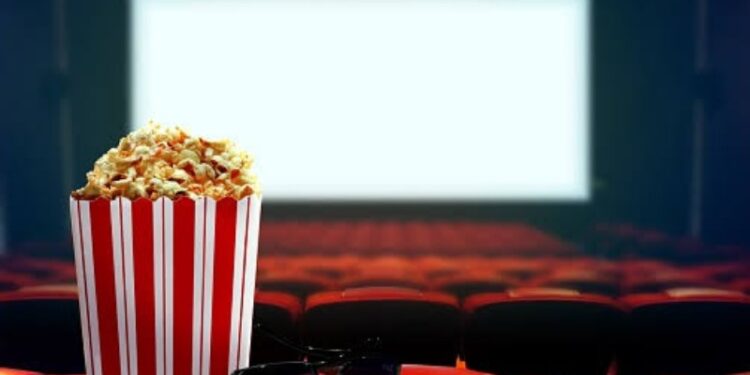Popcorn: the savoury smell, the crunchy bite, the salty kick, the buttery finish. Many cinema enthusiasts enjoy savoring the crisp popcorn kernels as their eyes feast on the big screen. Popcorn has comfortably become the perfect snack to have while watching a movie. It is the staple snack at movie centres. But have you ever wondered why popcorn and going to the movie theatre go hand in hand?
This piece discusses the short history of popcorn at the movies and why you should ditch popcorn at movie theatres.
Popcorn and the Movies
Unlike other confections, popcorn sales increased throughout the Depression. A major reason for this increase was the introduction of popcorn into movie theatres and its low cost for both patron and owner. One theatre owner actually lowered the price of his theatre tickets and added a popcorn machine. He soon saw huge profits.
The “talking picture” solidified the presence of movie theatres in the U.S. in the late 1920s. Many theatre owners refused to sell popcorn because they felt it was too messy. Industrious vendors set up popcorn poppers or rented storefront space next to theatres and sold popcorn to patrons on their way into the theatre. Eventually, theatre owners began installing popcorn poppers inside their theatres; those who refused to sell popcorn quickly went out of business.
Why Do Movie Theaters Serve Popcorn?
According to Andrew F. Smith, author of Popped Culture: A Social History of Popcorn in America, a few converging aspects made popcorn the quintessential movie snack. Mostly, the snack’s price, convenience, and timing played a crucial role. Popcorn was cheap for sellers and customers, and making it didn’t require much equipment. Popcorn also became popular when movie theatres desperately needed an economic boost, which is how popcorn was introduced to the silver screen.
Fun fact: popcorn does not refer to the popped kernel alone. It’s also the name for the specific type of corn used to make the snack. It was originally grown in Central America and became popular in the U.S. in the mid-1800s. Compared with other snacks at the time, it was super easy to make, and it got easier in 1885 when the mobile steam-powered popcorn maker was invented. What hit the streets in the late 19th century was a fleet of independent popcorn purveyors. They were like the great-great-grandfathers of food trucks.
Since popcorn was cheap to make, it was also cheap to buy, which increased the popularity of this treat during the Great Depression. The Depression increased consumer spending on cheaper luxury items such as popcorn and movies, and the two industries teamed up. Theatres would allow a particular popcorn salesman to sell right outside the theatre for a daily fee. By the mid-1940s, however, movie theatres had cut out the middleman and begun to have their own concession stands in the lobby. Introducing the popcorn-driven concession stand to movie theatres kept the movie theatre industry afloat, and popcorn has been a movie-watching staple ever since.
Ditch The Popcorn!
- Bringing a delicious snack to the cinema can ruin your experience, study claims
- People enjoy leisure activities less with food because it decreases engagement.
- Popcorn makes your brain focus on how it will taste rather than on the film itself.
- However, sweets can help brighten boring experiences, such as queuing.
Taking popcorn or other treats to the cinema may make for a tasty accompaniment, but new research suggests snacks can actually ruin the experience, Dailymail reports.
According to experts from Erasmus University, delicious treats can distract your brain and make it focus on how the food will taste rather than the film itself.
However, scientists say that a snack such as a chocolate biscuit or bag of your favourite sweets can be a useful way to brighten up tedious or painful experiences such as queuing.
The study by the Rotterdam School of Management at Erasmus University found that people enjoyed leisure activities less when food was present because it decreased their engagement with the experience.
Researchers Dr Anne-Kathrin Klesse and Dr Emily Garbinsky said, ‘Companies intentionally use food to create enjoyable customer experiences.
‘For instance, amusement parks, movie theatres and concert venues offer food accompaniments to boost customers’ enjoyment of these experiences.
‘However, this research indicates that this strategy may actually backfire.’
Professor Klesse added, ‘Being able to enjoy experiences fully is central to happiness and wellbeing.
Our research offers important insights into what environmental factors can negatively impact consumers’ enjoyment of ongoing experiences.
‘It is important to create a setting where consumers can be fully engaged to maximise the enjoyment from experiences, such as listening to a concert.
‘The presence of tempting food is therefore detrimental because it distracts consumers who are invited to imagine what they’ll taste next, and this actually decreases their engagement with and enjoyment of their current experience.’










